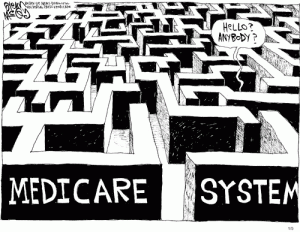By Steve Moran
I am finally coming to believe I understand what kind of senior living will appeal to nearly everyone. But I fear traditional senior living providers will disagree, maybe even hate my thinking.
For this reason, it will almost certainly end up being created by someone who is not today in the senior living space.
Are you ready for it?
Here it is:
It is not senior living!
I am 64 years old and this weekend spent a blissful hour teaching a bunch of 11- and 12-year-olds at church. Then I attended a church picnic where I spent the entire time hanging out with adults who ranged in age from early 20s to 80s. It seems improbable that when I get to be 80, 90, or even 100 I am going to say “I only want to hang out with people who are old like me.”
It will never happen.
What I Want, What Boomers Want
I am not ignorant or delusional about what will happen in my life. I will either die or begin to lose functional capability.
The entire idea of a senior living community ghettoizes age. It takes the most valuable knowledge bank of society and warehouses it. This may have been tolerated by an older generation who felt there were no other options, but for people who grew up in the 1960s and 70s, one of their main ambitions is to have continued impact in the world around them and to maximize their potential. These traditional offerings are not addressing their desires. This is an industry that is ripe for disruption and that disruption is already beginning.
David Stewart, founder and CEO of AGEIST
I would rather lose capability than die and I hope that what goes first is the physical and not the cognitive, but, at the end of the day, these things will happen.
“Personally I don’t believe in segmentation by age anymore. Coming from the ad-industry background, I have been drilled to think in time-boxes millennials, baby-boomers . . . etc. When I look around those old metrics don’t work any longer.
At THE EMBASSIES we believe in segmentation by shared beliefs and values. Personally I believe that’s it when people say I might be 70 but I rather feel like 50 this is what they are saying and asking for.“
Jan Garde Founder THE EMBASSIES
What this means is that I will need help. How I get that help and how it fits with living a full life is the big puzzle that senior living has not yet figured out. But here is what I am thinking it might look like:
It will be a campus that has single family homes, cottages, condos, and apartments. They will be accessible and will have at least the capability to provide active monitoring when I need it (think emergency call systems on steroids). The campus will not be age restricted.
There will be care staff, nurses, and perhaps physician services available at just the level I need. There will be a variety of intergenerational activities largely staffed by residents (young, middle age, and older) some of whom will be paid. Some of the grandparents will be part of the campus daycare program, they will be part of the after-school mentoring program.
I will hang out not with people based on my age but with people who have similar interests, passions, and energy levels. I will continue to make new friends, to learn new things, and to teach others things I know.
Because it is not age restricted, there will be no stigma for living there. It will simply be home. Because it is simply home, I will live longer, and happier, plus it will reduce medical costs for society.
When I die and that time will surely come, it will be with my friends and family of all ages and generations.
This will be the senior living of the future, that anyone, everyone can embrace.
Ultimately this is the life everyone wants young and old, what you are really talking about is intentional communities what are often referred to as “intentional communities”. The big challenge is how we actually make this into a reality. How do we make sure there are younger and older people; make sure everyone’s needs get served without anyone feeling like they are being taken advantage of.
Lynne Katzmann,
Founder, CEO Juniper Communities









Hi Steve!
Your article comes at the right time! I’m not sure if I started this company to be a Billionaire but you nailed it! Change is coming for our industry.
Check out my new company at http://www.vineyardcommunityliving.com/
Best,
John